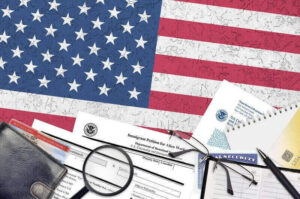Your Guide To Passing The U.S. Citizenship Test In Houston
Key Takeaways:
- The U.S. citizenship test has two parts: civics and English.
- The civics test evaluates your knowledge of U.S. history, government, principles of democracy, and civic responsibilities. You must have at least 6 correct answers.
- The English test measures reading, writing, and speaking skills.
- Houston offers many free or low‑cost study resources, and a citizenship lawyer can help guide your preparation.

The U.S. citizenship test is one of the last steps between you and your oath ceremony. It’s your chance to demonstrate your understanding of American history, government, and the English language. For many in Houston, this moment feels both exciting and intimidating.
With preparation, you can walk into your naturalization interview confident and ready. Understanding the test’s structure, knowing what to expect, and practicing regularly will make all the difference. Houston offers plenty of resources, and if you use them well, passing the test can be a rewarding and even enjoyable part of your citizenship journey.
Why The Citizenship Test Matters
The citizenship test isn’t just a formality. It ensures that new citizens have the knowledge and language skills to fully participate in civic life. Passing shows USCIS that you’re prepared for the responsibilities and privileges of U.S. citizenship.
For Houston residents, the test is also a milestone of belonging. It marks the moment you can speak with pride about your country’s history and take part in its future. Mastering it will give you more than a passing score; it will give you confidence in your role as a U.S. citizen.
What Is The Civics Test?
The civics test measures your knowledge of U.S. history, government, and the responsibilities of citizenship. It’s given orally by a USCIS officer during your naturalization interview, so preparation is key.
Structure Of The Civics Test
The civics portion of the naturalization interview is an oral test about U.S. history and government. The official USCIS civics list contains 100 possible questions. For most applicants, the officer will choose up to 10 of them during your interview, and you must answer at least six correctly to pass.
If you are 65 or older and have been a lawful permanent resident for at least 20 years, you qualify for the 65/20 special consideration. In that case, you study a shorter list of 20 specially marked civics questions. The officer will ask up to 10 questions from that list, and you still need to answer at least six correctly. You may also take the civics test in your native language. There are no trick questions here. The officer reads each one aloud, and you respond from memory.
Topics Covered
The questions in the civics test for naturalization are organized into categories that reflect the history, values, and functions of the United States. Preparing in each area will help you feel confident during your interview. Here are the subject areas you will need to study before your interview.
| Subject Area | What It Covers |
| Principles of American Democracy | The Constitution, the Bill of Rights, and core freedoms such as speech and religion. |
| System of Government | The three branches of government, the powers held by elected officials, and how elections are conducted. |
| Rights and Responsibilities of Citizens | Civic duties like voting, paying taxes, serving on juries, and demonstrating loyalty to the United States. |
| American History | The colonial era, the American Revolution, the Civil War, and other significant events that shaped the nation. |
| Symbols and Holidays | National symbols, the flag, important holidays, and the national anthem. |
Studying these topics not only prepares you for the test but also builds a deeper understanding of the country you are joining as a citizen.
How To Navigate The English Test
The English test is designed to ensure you can speak, read, and write in everyday English. It happens during your naturalization interview, often without you realizing the speaking portion has already begun.
Speaking Portion
From the moment you meet your USCIS officer, they’ll be listening to how you respond in English. Many of their questions will come directly from your N‑400 application, such as your name, address, and work history. Your ability to answer clearly and understand their questions demonstrates your speaking skills.
Reading Portion
You’ll be asked to read aloud one of three simple sentences in English. The sentences may cover topics like history, civics, or everyday life. You only need to read one sentence correctly to pass this portion.
Writing Portion
You’ll be asked to write one of three sentences in English. The sentences are short and straightforward, often related to U.S. history or civics. Correct spelling and basic grammar are important, but perfection isn’t required; they’re checking for understandable, legible writing.
Tips For Mastering The Citizenship Test
Success on the U.S. citizenship test comes from steady preparation, not last‑minute cramming. By focusing on both the civics and English portions, you’ll be ready to handle whatever your USCIS officer asks during your interview.
Civics Test Strategies
Start early and review a few questions each day rather than trying to memorize all at once. Use flashcards, mobile apps, or USCIS study guides to make the material more engaging. Practicing aloud, especially with a friend or at a Houston community class, builds confidence for the real interview.
English Test Strategies
Practice speaking English in everyday situations, like ordering food or chatting with neighbors, to get comfortable using it naturally. Read simple news articles or online posts in English, and try writing short sentences daily. The more you immerse yourself in the language before your interview, the easier the speaking, reading, and writing portions will feel.
By balancing civics knowledge with regular English practice, you’ll walk into your interview prepared and confident. In Houston, you have access to plenty of community resources that can help you strengthen both skills at no cost.
Common Mistakes To Watch Out For
Even well‑prepared applicants can make errors that affect their test results. Being aware of these common mistakes can help you avoid unnecessary stress and delays.
- Waiting Until The Last Minute – Cramming rarely works for civics or language learning. Start early and review regularly.
- Memorizing Without Understanding – Knowing the words isn’t enough; you should understand the meaning so you can answer confidently.
- Skipping English Practice – Reading and writing require active use of the language. Make it part of your daily routine.
- Not Using Practice Tests – Taking timed mock tests will help you get used to the pace and style of real interview questions.
- Forgetting Required Documents – Double‑check your appointment notice and ID before leaving home.
Avoiding these pitfalls will make your preparation time more effective and your test day experience far less stressful.
Your Ally In Acing The Citizenship Test
Passing the citizenship test isn’t just about studying hard; it’s about preparing smart. At Houston Immigration Lawyers, we help you focus on the right material, sharpen your English skills, and walk into your interview with confidence. Whether you work with a citizenship attorney or our trusted naturalization lawyer team, you’ll get personalized strategies that fit your learning style and timeline.

From mock test sessions to document reviews, we make sure you’re ready for every question and requirement. If you’re serious about passing on your first try, schedule a confidential consultation with our citizenship law firm today and take the next step toward your oath ceremony.
FAQs About The U.S. Citizenship Test In Houston
Many Houston residents have similar questions when preparing for the citizenship test. Here are clear answers to help you feel confident as you get ready.
How Long Does The Citizenship Test Take?
The test itself usually lasts 20–30 minutes and is part of your naturalization interview. This includes both the civics and English portions.
What Happens If I Fail The Test?
You’ll get another chance to retake only the sections you didn’t pass. USCIS schedules the retest within 60–90 days.
Are There Any Exemptions To The Test?
Yes, there are age and disability exemptions. For example, older applicants with long‑term residency may qualify for a reduced number of questions or take the test in their native language.
Can I Use Study Notes During The Test?
No, you must answer from memory during the test. However, you can study with notes, flashcards, and apps before your interview.
Preparing early, using reliable resources, and practicing regularly will give you the best chance of success. And if you want extra guidance, a trusted citizenship lawyer can help you prepare strategically for both the civics and English portions.
About The Author: Kate Lincoln-Goldfinch
 Kate Lincoln‑Goldfinch founded Houston Immigration Attorneys in 2015 and serves as its managing partner. After earning her J.D. from the University of Texas School of Law in 2008, she launched her advocacy journey as an Equal Justice Works Fellow supporting detained asylum‑seeking families. Today, Kate concentrates on family‑based immigration, deportation defense & humanitarian relief, including asylum & VAWA cases. She volunteers as Pro Bono Liaison for the AILA Texas Chapter and was honored as a Top Immigration Attorney by Austin Monthly in 2024. A mother of two, Kate is driven by a passion for immigrant justice and building stronger communities.
Kate Lincoln‑Goldfinch founded Houston Immigration Attorneys in 2015 and serves as its managing partner. After earning her J.D. from the University of Texas School of Law in 2008, she launched her advocacy journey as an Equal Justice Works Fellow supporting detained asylum‑seeking families. Today, Kate concentrates on family‑based immigration, deportation defense & humanitarian relief, including asylum & VAWA cases. She volunteers as Pro Bono Liaison for the AILA Texas Chapter and was honored as a Top Immigration Attorney by Austin Monthly in 2024. A mother of two, Kate is driven by a passion for immigrant justice and building stronger communities. 

